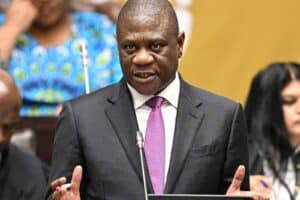The roads agency has reacted to Outa's claims that the e-toll management tender makes no sense, as the future of e-tolls is undecided.

Only part of the tender issued by the SA National Roads Agency (Sanral) – for the management of its open road tolling system in Gauteng, national Transaction Clearing House (TCH) and violations processing centre – relates to e-tolls on the Gauteng Freeway Improvement Project (GFIP).
Sanral spokesperson Vusi Mona confirmed this on Wednesday, while stressing that Sanral has to continue with its operations and be ready for any instruction it receives from the Department of Transport, related to the future of e-tolls.
Mona was responding to a request for comment on several claims made by the Organisation Undoing Tax Abuse (Outa) on Tuesday.
These claims include that for Sanral to enter into any e-toll-related contract makes no sense, when the country is waiting for Cabinet’s decision on the future of e-tolls. Also, it makes no financial sense because the cheapest bid submitted works out to an average of almost double the collection rate mentioned in Sanral’s 2019 annual report, before any money is allocated to the Sanral bonds.
Outa’s statement followed Sanral’s confirmation on Monday that it is evaluating tenders it received for the continued management of e-tolls after its existing contract with Electronic Tolling Collections (ETC) expires on December 2.
Mona said the tender issued is scalable and, among other things, for the operation of all services relating to the TCH, including the clearing of electronic toll transactions at conventional toll plazas and the suite of value-added services, such as parking payments.
Expanded scope
Moneyweb reported in October that Sanral was in the process of repackaging and expanding the function of its TCH to provide a host of other mobility services.
The TCH is currently almost exclusively used for clearing e-toll collections for various toll operators and toll plazas.
Alex van Niekerk, planning, transportation and toll manager for Sanral, said at the time that the initiative will result in the e-toll account becoming a mobility account that could, for instance, be used for vehicle licence renewal payments, cashless parking, fuel payments and to use Sanral’s customer service centres for driving licence renewals.
Resignation
Sanral reported on Wednesday that Van Niekerk has resigned, effective from February 28 next year, to pursue another career opportunity.
The agency added that for the past 14 years Van Niekerk was responsible for the GFIP and worked hard to improve and stabilise the operations of Sanral’s electronic tolling unit.
Despite testing times for the GFIP scheme, Van Niekerk remained committed to what is essentially government policy and executed his responsibilities to the best of his ability, Sanral said.
Sanral CEO Skhumbuzo Macozoma said on Wednesday: “We are sad to lose such a knowledgeable individual especially in the tolling field. Sanral sincerely thanks him for his contribution and leadership during his tenure with the organisation.”
Unenviable task
Wayne Duvenage, the CEO of Outa, said on Wednesday that while it conducted robust debates with Van Niekerk, he was unfortunately given the unenviable task of trying to implement the disastrous e-toll scheme.
Duvenage said Van Niekerk was no doubt good at his job in many of the road projects he managed, but no amount of expertise could produce the necessary magic to make any semblance of success of the e-toll scheme.
“We wish Alex every success in his new role and can only imagine that he will be extremely relieved at being able to walk away from what must have become one of the most stressful jobs in the country,” he said.
Outa said on Tuesday that three companies had submitted bids in response to the tender.
They are Phambili joint venture (JV) with a bid of R11.399 billion, Kusa Kokutsha (R7.548 billion) and SAeTO, which did not list a bid amount, it said.
Outa said Kusa Kokutsha was only registered as a business on August 26, appears to have been set up specifically to bid for the Sanral contract and, through its directors, is linked to outgoing contractor ETC.
‘Standard practice’
Mona said it is standard practice during a tender process, especially for large diverse tenders, that companies create a joint venture, or form a special company to meet all the requirements set out in the tender.
He said an open tender process is followed and any company could tender.
“While the tender process is still underway Sanral cannot comment on the way in which Kusa Kokutsha is constituted. However, ETC was a special purpose vehicle and could therefore not tender in its current form,” he said.
Mona added that contractors are paid the tendered rates per item for services provided.
If expected services tendered for do not realise, the contractor is not paid for those services, he said.
Mona said to date the amount paid to ETC in the past five years is R4.98 billion, excluding Consumer Price Index adjustments and Vat, which is lower than its original tender bid price of R8.8 billion, excluding R2.5 billion provisional amounts for expected costs such as rates and taxes and postage, communication and banking costs.
Brought to you by Moneyweb






